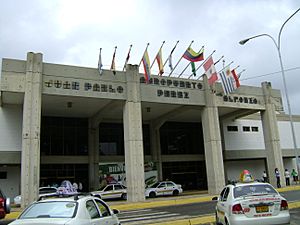Juan Pablo Pérez Alfonzo facts for kids
Quick facts for kids
Juan Pablo Pérez Alfonzo
|
|
|---|---|
| Minister of Development of Venezuela | |
| In office 15 November 1945 – 9 April 1948 |
|
| President | Rómulo Betancourt Rómulo Gallegos |
| Minister of Mines and Hydrocarbons of Venezuela | |
| In office 13 February 1959 – 23 January 1963 |
|
| President | Rómulo Betancourt |
| Succeeded by | Arturo Hernández Grisanti |
| Personal details | |
| Born | 13 December 1903 Caracas, Venezuela |
| Died | 3 September 1979 (aged 75) Washington D.C., USA |
| Spouse | Alicia Castillo |
| Profession | diplomat, politician, lawyer |
| Signature | |
Juan Pablo Pérez Alfonzo (born December 13, 1903 – died September 3, 1979) was an important Venezuelan diplomat, politician, and lawyer. He is best known for helping to create OPEC, the Organization of Petroleum Exporting Countries. He worked closely with Saudi Arabian minister Abdullah Tariki to make this happen.
Contents
Early Life and Studies
Juan Pablo Pérez Alfonzo was born in Caracas, Venezuela. He first studied to become a doctor. Later, he changed his path and earned a PhD in political and social sciences. He got this degree from the Central University of Venezuela.
His Political Journey
Working for President Gallegos
Pérez Alfonzo was one of the people who helped start the political party called Democratic Action (AD). When Rómulo Gallegos became president of Venezuela (1947–1948), Pérez Alfonzo served as the Minister of Development.
During this time, he worked to increase Venezuela's oil income. He did this by raising taxes on oil companies. This new rule became known as the "50/50 formula." It meant that oil companies had to share half of their profits with the country. At first, big oil companies, sometimes called the "Seven Sisters," were not happy. They even threatened to produce less oil in Venezuela. But Pérez Alfonzo encouraged other countries to use the 50/50 rule, and many did. This rule was used around the world until 1970.
Exile and Return to Government
In November 1948, the military took over Venezuela's government. President Gallegos was removed from power. Pérez Alfonzo was put in jail for nine months. After that, he found safety in the United States. He later moved to Mexico for financial reasons.
He stayed in Mexico until 1958, when democracy returned to Venezuela. The new president, Rómulo Betancourt, asked him to come back and work for the government. This time, he became the Minister of Energy. While he was in Washington, he studied how the oil industry worked globally. He learned a lot from the Texas Railroad Commission (TRC). Their methods for managing oil production helped him develop his ideas for creating OPEC. He wanted to protect oil prices and make sure oil was used wisely.
Creating OPEC with Betancourt
As the Minister of Mines and Hydrocarbons for President Rómulo Betancourt (1959–1964), Pérez Alfonzo played a key role. He was responsible for creating OPEC (Organization of Petroleum Exporting Countries). The goal of OPEC was to control oil production and increase oil prices in the world market.
In 1960, the US President Dwight Eisenhower set limits on how much Venezuelan oil could be imported. This favored oil from Canada and Mexico. Pérez Alfonzo, often called the "Father of OPEC," reacted to this. He looked for an alliance with Arab oil-producing nations. He wanted to protect Venezuela's oil independence and profits. This led to a strong connection between Venezuela and the Middle East that still exists today.
Pérez Alfonzo used his notes from studying the TRC. He even had them translated into Arabic. These ideas were very helpful at a meeting in Cairo, which was a big step towards forming OPEC. There, he met Abdullah Tariki, the oil minister of Saudi Arabia, who became a co-founder of OPEC.
Personal Life
Juan Pablo Pérez Alfonzo was a vegetarian. He lived a simple life.
His Legacy and Passing
After the 1973 oil crisis, Venezuela became very rich for a short time. But Pérez Alfonzo gave a warning in 1976. He said, "Ten years from now, twenty years from now, you will see, oil will bring us ruin..." This was a prediction about what is now called the "natural resource curse." This curse happens when a country relies too much on one natural resource.
His warning came true during the "1980s oil glut." OPEC countries did not always stick to their agreed production limits. Because of this, oil prices dropped sharply again.
Pérez Alfonzo passed away in Washington, D.C., on September 3, 1979. He was 75 years old and had pancreatic cancer.
In 1991, the airport in El Vigía was named the Juan Pablo Pérez Alfonzo Airport to honor him. Since 1998, Venezuela has an award called the "Orden Juan Pablo Pérez Alfonzo." It is given to people who do important work related to mining, oil, and energy.
See also
 In Spanish: Juan Pablo Pérez Alfonzo para niños
In Spanish: Juan Pablo Pérez Alfonzo para niños
 | Frances Mary Albrier |
 | Whitney Young |
 | Muhammad Ali |


